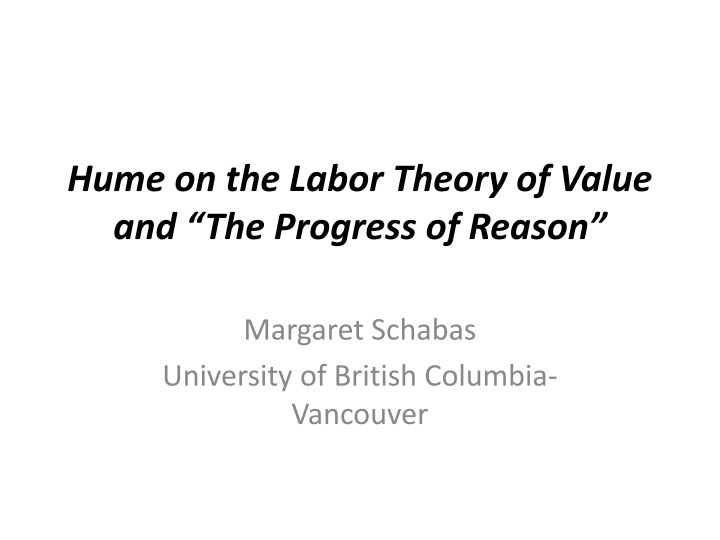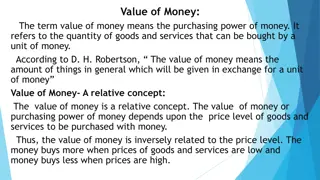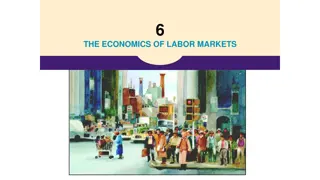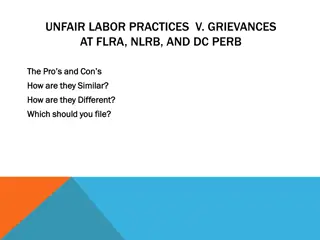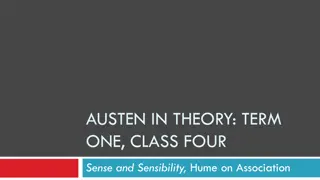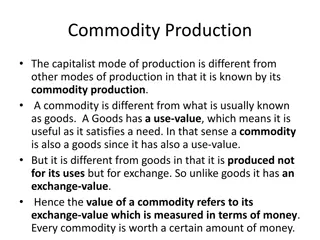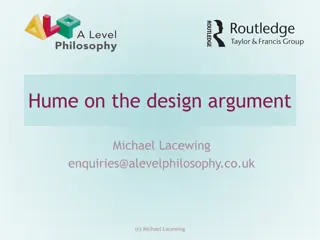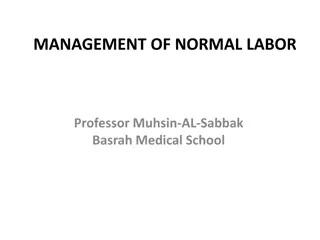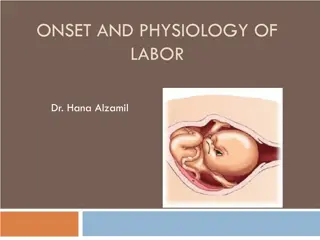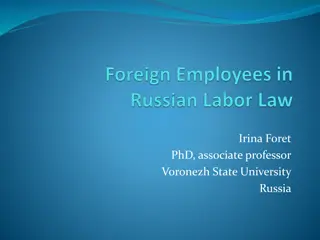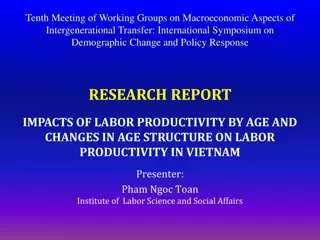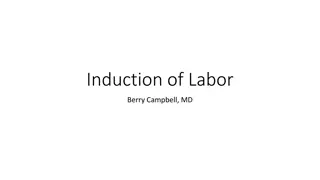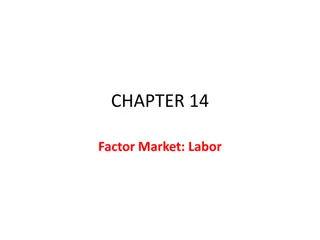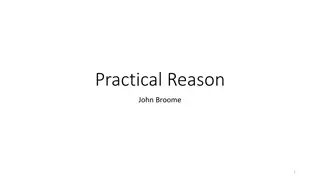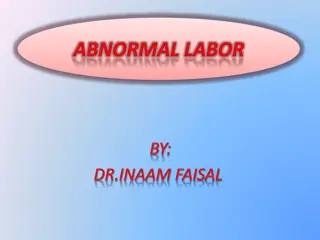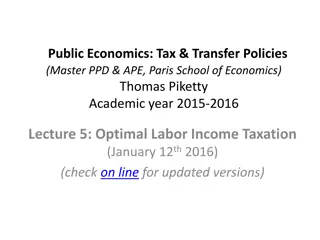Hume's Views on Labor Theory of Value and Reason's Progress
Hume's perspective on the Labor Theory of Value challenges traditional views, suggesting he may not have adhered to it like Adam Smith. Contrary to his critics, Hume valued merchants, advocating for higher wages and reduced inequality. He embraced liberal ideas promoting freedom, equality, and virtues different from those highlighted by Smith.
Download Presentation

Please find below an Image/Link to download the presentation.
The content on the website is provided AS IS for your information and personal use only. It may not be sold, licensed, or shared on other websites without obtaining consent from the author.If you encounter any issues during the download, it is possible that the publisher has removed the file from their server.
You are allowed to download the files provided on this website for personal or commercial use, subject to the condition that they are used lawfully. All files are the property of their respective owners.
The content on the website is provided AS IS for your information and personal use only. It may not be sold, licensed, or shared on other websites without obtaining consent from the author.
E N D
Presentation Transcript
Hume on the Labor Theory of Value and The Progress of Reason Margaret Schabas University of British Columbia- Vancouver
Did Hume have a Labor Theory of Value? Received View is Negative In contrast to Adam Smith, Hume may not have a theory of value or of price Hume was not sympathetic to the lower orders
Naysayers Keynes: Hume s foot-and-a-half in the classical world Eugene Rotwein, Terence Hutcheson, Andrew Skinner all emphasize Hume s mercantilist leanings Hume saw merchants as the heroes of the modern era EPM portrays the merchant as the hand of providence Smith much more enthusiastic about agrarian capitalism
What is the Labor Theory of Value? Multiple meanings Assume it served as a unifying thread for the classical economists, from Smith to Cairnes. Labor creates value and wealth and the price is primarily a function of the wage. Capital is produced by labor and its genealogy traced back to labor, as in Locke s loaf of bread Correlative belief: acknowledge the rights and wellbeing of laborers
Hume on Inequality Hume was not an egalitarian; perfect equality would degenerate into tyranny (EPM) Hume sought to reduce inequality Hume advocated high wages and lower profit rates; critical of idle rentier class Modern commercial era and spread of manufacturing would enable wealth to trickle down (E-265)
Hume more liberal than Smith Industry in the service of freedom and happiness Financial sector a powerful solvent on social ranks, conventions and the inhibiting mores of former ages Hume more open about libertine virtues and the importance of friendship than Smith Far more attentive to the standing of women and their inclusion in male company to further feminine talents and dispositions Contrast Smith s salient virtues: courage, self-command, and magnanimity (masculine), with Hume, who identified the salient virtues as gentleness, humanity, beneficence, affability . . . and gaiety (EPM 79)
Hume on the progress of reason Long narrative on the decline of superstition and enthusiasm, the elimination of total ignorance. Of the Protestant Succession Idea of a Perfect Commonwealth Reformation of critical importance Promoted independent thought and literacy Mobilization of skilled labor, e.g. the expulsion of a million Huguenots in 1695 Strong work ethic; everyone swept up in the spirit of the age that promotes arts and sciences Weavers capable of adjusting their expenditures, undertaking the expedients of frugality and industry in years of scarcity (E-347) In the case of monetary interventions, such as a debasement, or an arbitrary tax, the people in this country (UK) are so good reasoners whatever regards their interests, that such a practice will deceive nobody (E-638).
Hume on LTV Footnote in the Treatise where Hume takes issues with Locke s ascription of property emanating from one s labor, more specifically, the metaphor of fixing labor into objects. Hume states plainly, we cannot be said to join our labour to any thing but in a figurative sense. Properly speaking, we only make an alteration on it by our labour (T 324n). Hume s objective is to expose property as entirely conventional and hence justice as an artificial virtue .
Hume on LTV The footnote is still consistent with a LTV Every thing in the world is purchased by labour; and our passions are the only cause of labour (E-261). Labor for Hume creates all wealth, both in a barter regime (indolence breeds poverty) and in his analysis of modern UK in the Cadiz passage in Of Money Insight is that weavers and farmers work with greater alacrity and attention for an interval before prices and then wages rise. This results in a greater GDP.
Hume held a LTV Analysis of prices commits to a number of price adjustment mechanisms; the scissors of supply and demand on market prices; the pull of aggregate demand and the balance of trade on the price level overall. specie-flow mechanism Hume inclined to underscore factor mobility both regionally and internationally, including labor mobility More than Smith, who claimed that a man is of all sorts of luggage the most difficult to be transported (WN 1:93).
Hume on Longterm Prices P = f (M/Y) A crown [5 shillings] in Harry VII s time served the same purpose as a pound does at present (E-281). 1492-1502, Money supply in Europe doubled and by 1750 may have increased by almost a factor of 8m Hume conjectures. P = 4; M = 8 Hence Y = 2
LTV Hume clear that the economic growth explains why the price level has not risen commensurate with the money supply Due to capital accumulation (innovations and inventions in manufacturing), the stimulus of money (the income multiplier), but above all, the more effective labor supply When one nation has gotten the start of another in trade, it is very difficult for the latter to regain the ground it has lost; because of the superior industry and skill of the former, and the greater stocks, of which its merchants are possessed, and which enable them to trade on so much smaller profits (E-283). Migration of Economic Opportunity to regions of lower wages.
Labor of Body and Mind Hume commits to a strong work ethic in modern UK, in the sense that indolence will seem a punishment (E-171). In times when industry and the arts flourish, . . . the mind acquires new vigour; enlarges its powers and faculties; and by an assiduity in honest industry, both satisfies its natural appetites, and prevents the growth of unnatural ones, which commonly spring up, when nourished by ease and idleness (E-270). Excellent woollen cloth is produced in the modern era because the minds of men . . . turn themselves on all sides, and carry improvements into every art and science (E-271). Men enjoy the privilege of rational creatures, to think as well as to act, to cultivate the pleasures of the mind as well as those of the body (E-271).
Humes Sympathies with Laborers Number of criminals executed dropped from 2,000 per year under Henry VIII to only 400 per year under Elizabeth I. Why? The spread of commerce such that the poor could now find employment with greater ease, provide for their families and not resort to theft or robbery (HE 3:329). Collapse of the Bank of Ayr (1772), Hume expressed fears that a cascade of insolvencies would ensue. Hume remarks that the Carron Ironworks near Stirling is reeling, which is one of the greatest Calamities of the whole; as they gave Employment to near 10000 People (HL 2:263).
Upward Mobility People at birth more or less alike Hume grants that there are low people, without education, [who] will start up amongst us, and distinguish themselves in every profession (E-208n). Smith: an upstart is always disagreeable (LJ 402). Woeful account of the ambitious poorman s son who strives to climb up the social strata (TMS). Hume conjectures that in 500 years, footmen and those in the carriages will have changed places; appeals to the trope of generational decay, both the prodigal son and the retired merchant.
Labor Mobility Hume commits to a high degree Workers seek out higher wages Law of One Price: there cannot be two Prices for the same Species of Labour (HL 2:94). Regional price variance in England less than in France; London-Yorkshire versus Paris- Languedoc
Price governed by Wage Demand plays an indisputable role in Hume s account of price movements, but true of Smith and Ricardo Cost of labor is still more important In his letter to Turgot (1766) Hume makes clear that the price is a function of the wage, and that this holds for almost every commodity (HL 2:94) Built into his remark about potential rivalry with China
Hume on Value and Prices Distinction between pecuniary and non- pecuniary goods do not readily correlate with utility Implication is that pecuniary goods correlate with labor Hume s 1776 criticism of Smith on the composition of prices price = wage + profit but not rent
Hume on Nominal/Real Capital is a kind of storehouse of labour (272). It is evident, that the greater or less stock of labour and commodities must have a great influence; since we really and in effect borrow these, when we take money upon interest (E- 304). Price level of no consequence; the magistrate ought to keep alive a spirit of industry in the nation, and encrease the stock of labour, in which consists all real power and riches (E- 288).
Population Growth Urbanization and demographic growth in general the source of wealth Hume s Blue Banana (Dover-Calais axis) Towns and cities more liberal and more opportunities for women to advance Hume draws insights on the microdecisions that determine the birth rate e.g. under slavery; women are the original source of labor
Conclusion Hume commits to labor as the source of wealth and as the key determinant of the value of wage-goods Factor mobility forged uniform wage and profit rates within a nation; wages move inversely to profits Real prices have fallen secularly as real wages have risen and real profits have fallen
Hume on Inequality Hume strives to reduce inequality, e.g. between men and women and between middle class and aristocracy; but he is not indifferent to the lower orders His admonitions to equality in the EPM are directed at Locke s theory of property in the state of nature. Celebrates modern commercial world, urbanization, novel luxuries, libertine mores In modern commerce, however, Hume observes that as the multitude of mechanical arts is advantageous, so is the number of persons to whose share the productions of these arts fall. A too great disproportion among the citizens weakens any state. Every person, if possible, ought to enjoy the fruits of his labour, in full possession of all the necessaries, and many of the conveniences of life. No one can doubt, but such an equality is most suitable to human nature, and diminishes much less from the happiness of the rich than it adds to that of the poor (E-265).
